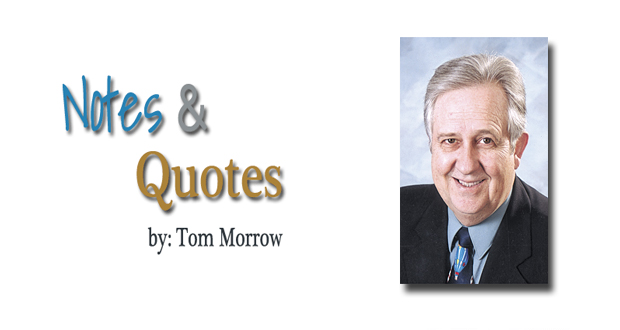By Tom Morrow
Today, it’s almost impossible for anyone to poke fun at both sides of the political spectrum and still be admired and liked. That certainly was the sort of common-sense observer of life that Will Rogers was.
Born in Oklahoma on Nov. 4, 1879, Rogers was an American stage and film actor, vaudeville performer, cowboy, humorist, newspaper columnist, and social commentator. He was a citizen of the Cherokee Nation in the Indian Territory (now Oklahoma).
His parents, Clement Vann Rogers (1839–1911) and Mary America Schrimsher (1838–1890), were both of mixed race and Cherokee ancestry, and identified as Cherokee. Rogers always quipped his ancestors did not come over on the Mayflower, but they “met the boat.”
As an entertainer and humorist, he traveled around the world three times, made 71 films (50 silent films and 21 “talkies”), and wrote more than 4,000 nationally syndicated newspaper columns. By the mid-1930s, Rogers was hugely popular for his leading political wit and was the highest paid of Hollywood film stars.
His earthy anecdotes and folksy style allowed Rogers to poke fun at gangsters, prohibition, politicians, government programs, and a host of other controversial topics in a way that found general acclaim from a national audience with no one offended. He often proclaimed: “I am not a member of an organized political party. I am a Democrat.”
In 1901, when he was 22 years old, Rogers and a friend left home to work as gauchos (cowboys) in Argentina, but they lost all their money. In turn Rogers sailed for South Africa where he was hired at a ranch. It was in South Africa where Rogers started his show business career as a trick lariat roper in the Texas Jack’s Wild West Circus. He said regarding that time, “I learned the great secret of show business — knowing when to get off the stage. It’s the fellow who knows when to quit that the audience wants more of.”
From South Africa Rogers took his roping act to Australia where he continued to perform. He returned to the United States in 1904, appearing at the St. Louis World’s Fair, and then began trying his roping skills on the vaudeville circuits which led him to New York’s Ziegfeld Follies on Broadway.
In 1918, Hollywood discovered Rogers. Samuel Goldwyn gave him a three-year contract at triple his Broadway salary. He toured the lecture circuit and the New York Times syndicated his column, “Will Rogers Says,” which reached 40 million newspaper readers daily. From 1929 to 1935, Rogers made radio broadcasts of his homespun humor for the Gulf Oil Company, which ranked among the nation’s top programs. He was an enthusiast of aviation, and urged a military air force such as what his friend, Army Gen. Billy Mitchell, was advocating. During his lectures, Rogers quipped, “A humorist entertains, and a lecturer annoys.”
Although he supported President Franklin Roosevelt’s New Deal, he easily joked about it, saying “Lord, the money we do spend on Government it’s not one bit better than the government we got for one-third the money twenty years ago.”
Rogers increasingly expressed the views of the American “common man.” He downplayed academic credentials, noting, “Everybody is ignorant, only on different subjects.”
His newspaper column expressed his traditional morality and his belief that political problems were not as serious as they sounded. He urged isolationism for the U.S.
In 1935, Rogers asked his friend, famed aviator Wiley Post to fly him to Alaska searching for new material for his newspaper column. On Aug. 15, of that year, they left Fairbanks for Point Barrow. About 20 miles southwest of their destination they landed to ask directions. Upon takeoff, the engine failed and they plunged into a lagoon. Both men died instantly.
Before his death, Oklahoma commissioned a statue of Rogers, representing the state in Statuary Hall of the U.S. Capitol. Rogers insisted his image be placed facing the House Chamber so he could “keep an eye on Congress.” Over the years Capitol tour guides have said each president traditionally rubs the statue’s left shoe for good luck before entering the House Chamber to give the annual “State of the Union address.”
Many landmarks are named in the humorist’s honor: Will Rogers World Airport in Oklahoma City, the Will Rogers Turnpike of Interstate 44 between Tulsa and Joplin, Missouri, and 13 Oklahoma public schools.
U.S. Highway 66 is known as “The Will Rogers Highway.” With a dedication plaque at the roadway’s western terminus in Santa Monica.
There have been two U.S. Postage stamps dedicated in his honor and the U.S. Navy’s Benjamin Franklin class submarine, USS Will Rogers, (SSBN-659), was launched in 1966.
Some of his more popular saying were: “All I know is what I read in the newspapers.” “When I make a joke no one gets hurt; when Congress makes a joke it becomes law.”
But, Rogers’s most famous sayings was: “I never met a man I didn’t like.” It is the epitaph on his tombstone in Clairmont, Oklahoma.




